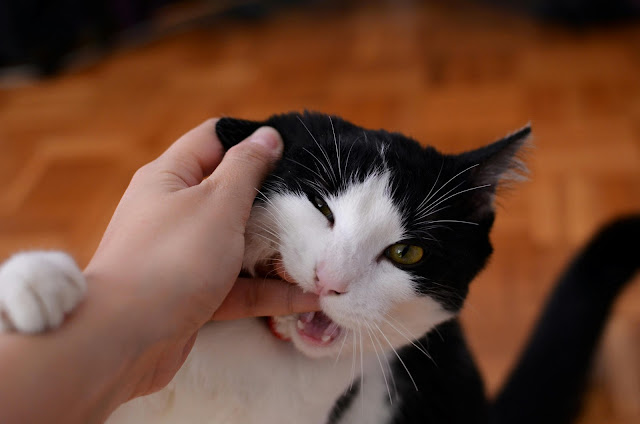How to Stop a Cat from Biting: Tips for Managing Aggressive Behavior
How to Stop a Cat from Biting: Tips for Managing Aggressive Behavior
Cats are known for their playful and curious nature, but sometimes this can lead to unexpected biting behavior. Whether it's a gentle nibble or a full-blown bite, understanding why your cat is biting and how to manage this aggressive behavior is essential for a harmonious home. In this article, we’ll explore the reasons behind cat biting and share effective tips to stop it.
Why Do Cats Bite?
Cats bite for several reasons, ranging from playful antics to stress or fear. Identifying the root cause of your cat’s biting behavior is the first step in resolving the issue.
Play Aggression
Kittens, in particular, may bite during play as they learn to hunt and explore their environment. Play biting is normal, but it can become a problem if left unchecked.Overstimulation
Cats can become overwhelmed by too much petting or handling, leading to sudden bites. They may give subtle signals before biting, such as tail twitching, flattened ears, or dilated pupils.Fear or Stress
A frightened or stressed cat may bite defensively. This can happen if they feel threatened, are in unfamiliar environments, or are experiencing a change in routine.Medical Issues
Sometimes, biting can be a result of pain or illness. If your cat’s biting behavior changes suddenly, a visit to the vet is essential to rule out any medical concerns.
How to Stop a Cat from Biting: 7 Effective Tips
Recognize Warning Signs
Pay attention to your cat’s body language to understand when they are about to bite. If you notice signs of overstimulation like tail swishing or sudden movements, give your cat some space before they feel the need to bite.Provide Appropriate Toys
Cats need an outlet for their energy. Make sure to provide a variety of toys that mimic hunting behaviors, such as feather wands or laser pointers. Redirect your cat’s biting behavior to these toys rather than your hands or feet.Avoid Rough Play
Never encourage rough play with your hands or feet. Even playful bites can turn into aggressive behavior if your cat learns that biting is an acceptable form of interaction. Always use toys to engage in play.Use Positive Reinforcement
Reward your cat for good behavior. If they play without biting, offer them treats or praise. Positive reinforcement helps to build good habits and encourages your cat to engage in more desirable behaviors.Set Boundaries
Teach your cat that biting leads to an end of attention. If your cat bites during play or petting, immediately stop interacting and walk away. This shows your cat that biting is not acceptable and that gentle behavior will earn your attention instead.Give Your Cat a Safe Space
Make sure your cat has a quiet place to retreat to when they are feeling stressed or overstimulated. This can be a cozy bed, a cat tree, or a separate room where they can relax without interference.Consult a Professional
If your cat’s biting is severe or if you’re struggling to manage the behavior, consider consulting a feline behaviorist or your veterinarian. They can provide personalized advice and rule out any underlying issues.
FAQs: Managing Cat Biting Behavior
Can I use punishment to stop my cat from biting?
No, punishing a cat for biting can lead to increased aggression or fear. Instead, focus on positive reinforcement and redirecting your cat’s energy toward appropriate activities.Why does my cat bite me after petting?
This is often a sign of overstimulation. Cats have a limit to how much handling they can tolerate, and biting may be their way of saying “enough.”How do I stop my kitten from biting?
For kittens, it’s essential to teach early on that hands and feet are not toys. Use interactive toys and stop playing immediately if your kitten bites.
Conclusion
Understanding your cat's behavior is key to managing and preventing biting. By recognizing the reasons behind your cat's aggression and using positive reinforcement techniques, you can stop biting and foster a healthier relationship with your feline friend. If you're patient and consistent, your cat will learn to play and interact in a gentle and enjoyable way.
.png)


.jpeg)
.jpeg)
.jpeg)



